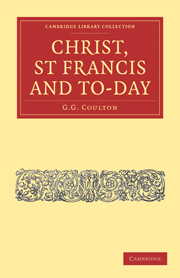Summary
I PROMISED in my last lecture to deal with the obvious objection that the gospels leave us no excuse for suspension of judgment on the question of miracles. Here, the analogy of Franciscan history throws a flood of light upon gospel history. A whole book might be written—and ought long ago to have been written—on this subject; but a few brief hints must suffice for this evening. I will here try to assume nothing as a certain fact but what is admitted by thoughtful students on all sides—fully admitted, for instance, by Mr N. P. Williams, a Fellow of Exeter College, who has lately printed in The Church Times a series of sermons expressly directed against the modernist party in the Church of England, and who may conveniently be cited as an unexceptionable witness here.
The earliest existing Christian documents date from more than twenty years after Christ's death; these are the first of St Paul's epistles. The gospels, as Mr Williams reminds us, ‘belong to the second generation.’ The first written, St Mark's, is never dated earlier than forty years after the crucifixion. Forty years, in the long perspective of history, is a very brief space indeed. When an authentic document can be shown to be 1860 years old, it seems hypercritical to emphasize its evidential inferiority to a similar document 1900 years old.
- Type
- Chapter
- Information
- Christ, St Francis and To-day , pp. 39 - 57Publisher: Cambridge University PressPrint publication year: 2010First published in: 1919

